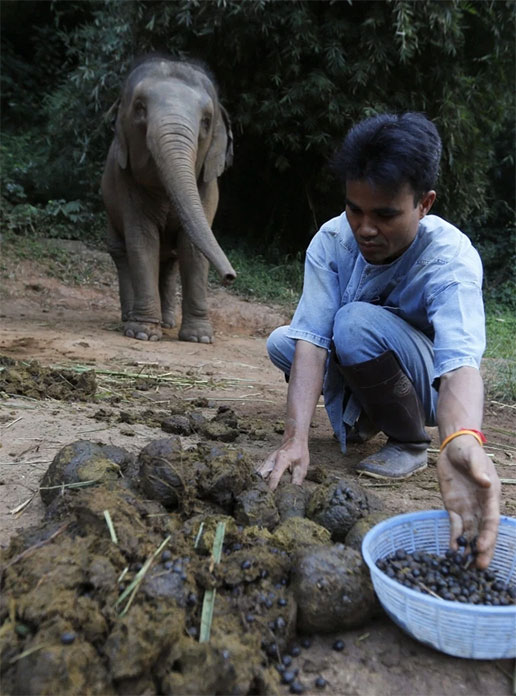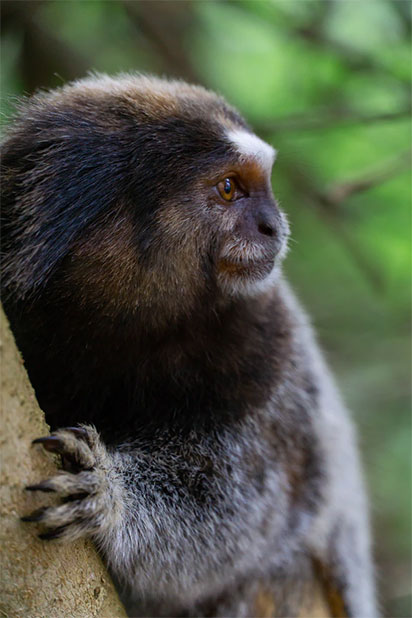5 + 1 types of coffee produced with the help of animals.

Fine coffee with the help of the ... animal kingdom.
There is no coffee lover who does not want to try the legendary Kopi Luwak from Indonesia, one of the most expensive, rare and gourmet coffees in the whole world. Kopi Luwak has acquired this special status, not only because of its taste, but also because of the unique way it is produced, which can even seem ... disgusting to the uninitiated.
This Indonesian delicacy is the best known of the coffees that we call "animal coffees", the coffees that are produced with the help of animals, and more specifically with the help of their digestive system. From Indonesia and Africa to India and Brazil, birds, bats, elephants, monkeys and ants produce original, delicatessen coffees, only for connoisseurs and coffee lovers.
5 + 1 είδη καφέ που παράγονται με τη βοήθεια ζώων.
 Kopi Luwak (Indonesia): This is the coffee that gave birth to the trend and comes from faraway Indonesia. Luwaks (muskrats, weasel-like wild animals) eat the coffee beans and eliminate the beans, which digestion has endowed them with a distinct taste profile. Although these grains used to end up in the poor plantation workers, their increased demand has made them a delicatessen, a rare and expensive product. Caution is required when buying Kopi Luwak, on the one hand because there are many inferior grains available on the market as Kopi Luwak, and on the other hand because there are farms where animals live in captivity and are fed by force. The authentic Kopi Luwak stands out not only for its unique taste, but also for the relevant certificate of authenticity, which certifies that Luwaks live freely in nature.
Kopi Luwak (Indonesia): This is the coffee that gave birth to the trend and comes from faraway Indonesia. Luwaks (muskrats, weasel-like wild animals) eat the coffee beans and eliminate the beans, which digestion has endowed them with a distinct taste profile. Although these grains used to end up in the poor plantation workers, their increased demand has made them a delicatessen, a rare and expensive product. Caution is required when buying Kopi Luwak, on the one hand because there are many inferior grains available on the market as Kopi Luwak, and on the other hand because there are farms where animals live in captivity and are fed by force. The authentic Kopi Luwak stands out not only for its unique taste, but also for the relevant certificate of authenticity, which certifies that Luwaks live freely in nature.
Jacu Coffe (Brazil): Jacu coffee comes from coffee beans collected from the stumps of birds of the same name, a protected pheasant-like bird species. Jacu coffee was born when these birds, which took refuge in the Pedra Azul environmental park in Brazil, raided neighboring organic coffee plantations. A farmer who knew the Indonesian Kopi Luwak tried to collect and roast the undigested grains from the feces of the birds, which devoured the most ripe and delicious cherries of the coffee trees. The result was a fruity coffee, with notes of apricots, berries and anise, but also a strong character of nuts. Thus, the Jacu "invasion" was caused by a problem, additional income for producers, as this coffee is of limited production and is sold relatively expensive.
Black Ivory Coffee (Thailand): One of the most expensive coffees in the world comes from Northern Thailand, where an Arabica coffee grower combined coffee cultivation with his love for Asian elephants. Nice pachyderms also feed on coffee beans, among others, and skilled workers are called upon to collect the grains from their feces. The journey of the beans to the gastrointestinal tract of the animal results in the breakdown of the proteins that are responsible for the bitterness of coffee, resulting in a unique taste and special aroma. The farm that produces Black Ivory is famous for the ethical treatment of its elephants, and as a result production is extremely limited and prices are high.
 Monkey Spit Coffee (India, Taiwan): Monkey spit is produced mainly on the island of Taiwan but also in the Chickmagalur region of India, on farms bordering forests, which are the natural home of the Macaque, a species of monkey. The monkeys often "visit" the plantations, they eat the ripe cherries from the coffee trees, but, not being able to chew the coffee beans, they spit them in the soil. The collection of this coffee has only started in recent years, as in the past half-eaten beans were considered useless. The production is really very small and it is almost impossible to expand on a large scale, and it is usually tourist-oriented, enjoying this particular coffee on the spot.
Monkey Spit Coffee (India, Taiwan): Monkey spit is produced mainly on the island of Taiwan but also in the Chickmagalur region of India, on farms bordering forests, which are the natural home of the Macaque, a species of monkey. The monkeys often "visit" the plantations, they eat the ripe cherries from the coffee trees, but, not being able to chew the coffee beans, they spit them in the soil. The collection of this coffee has only started in recent years, as in the past half-eaten beans were considered useless. The production is really very small and it is almost impossible to expand on a large scale, and it is usually tourist-oriented, enjoying this particular coffee on the spot.
Ant Coffee (Brazil): This unique coffee collected from ants, emerged when the Brazilian producer Joao Neto decided to follow the principles of organic farming on his farm, something that naturally filled it with numerous ... insects! Surprised, he noticed that a species of ants "stole" coffee beans to feed the larvae, leaving aside the hard and useless beans. In collaboration with a Japanese colleague, they tried to roast the beans, ending up in a coffee with strong acidity and notes of jasmine. Joao hardly produces more than .... 50 kilos of ant coffee a year, and usually packs it in small bags and gives it as a gift to his distinguished customers.
Bat Coffee (Madagascar): The island of Africa was not famous for its coffee until recently, as it was oriented towards mass production of Robusta, which was channeled into the instant coffee market. Arabica varieties that were introduced relatively recently in Madagascar upgraded the production and drove the ... bats crazy, which started chewing the coffee beans, sucking their juices. The half-eaten grains are then collected, cleaned and roasted, and fans claim that the enzymes in their bat saliva have endowed them with complex aromas and lively acidity.
"The rubbish of one is the treasure of the other," says a well-known phrase - and in the case of Animal Coffee, it could not describe the situation better.










